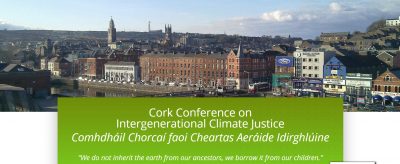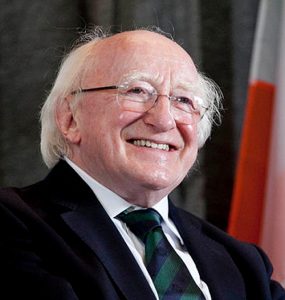
By Ann Marie Foley - 14 November, 2019
 The “rich world” has caused most of the greenhouse gas emissions and needs a major change, but has capability to do this and decarbonise.
The “rich world” has caused most of the greenhouse gas emissions and needs a major change, but has capability to do this and decarbonise.
This is according to President Michael D Higgins, who addressed the Cork Conference on Intergenerational Climate Justice.
In his opening comments the President thanked the organising committee and welcomed the young and not-so-young delegates who were present to learn more about what he called “the greatest contemporary challenge facing us as inhabitants of this planet in peril”.
President Higgins also congratulated those who organised and backed the event including the Social and Health Education Project, the Cork Education and Training Board, the Sisters of Our Lady Apostles, the Society of African Missions, the Eco-Congregation of St Anne’s and Blackpool Parish, Cork Healthy Cities, and Trócaire.
“Let me be very clear about the challenge we face: climate change is the most pressing issue facing us all as a global community. This year, Ireland became the second country in the world to declare a climate and biodiversity emergency, recognising the critical nature and scale of the challenge facing us all,” said the President.
“Climate disruption is a global issue, a national issue, and a local issue for which the window of opportunity to act is closing worryingly fast.” He went on to say that we are “at the precipice of a global ecological catastrophe”.
The conference focused on intergenerational aspects of climate change and climate justice. This is based on the premise that all generations are partners caring for and using the earth and that the present generation must pass on the earth and its resources in at least as good condition as it received them.
Many pupils and teachers were present from city and county schools. They were there to share ideas on climate justice, especially in a context in which climate change means future generations may well inherit a world that is impoverished, perhaps even unliveable.

President Michael D Higgins
The President said that modern political life is dominated by a culture of “short-termism”, and the lack of political capital is a major impediment to securing policy change. He said this inability to plan for the long term will have devastating consequences for future generations.
The version of economics that has dominated policy for almost 40 years has deepened inequality and impacted negatively on the poorest, but also, from an ecological perspective, it makes achieving sustainability near impossible. He added that a radical paradigm shift is required in the connection between ecology, economics and society.
He also spoke of the necessity for socio-economic measures in the short and medium term to offset negative impacts of the ecological transition for lower income groups. For example, in Ireland this will mean that those impacted by the closure of unsustainable carbon-intensive electricity production must be offered re-skilling opportunities to help them to find jobs in other areas such as the green economy, or in other parts of society.
The conference was held in Cork yesterday (13 November 2019). Other speakers included Dr Lorna Gold of Trócaire (and author and climate activist) and Fr Seán Healy of Social Justice Ireland.